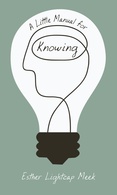How do we know what we know?

We all know that we are knowers, but we seldom think about knowing itself. For the most part, knowing is taken for granted until we encounter some really difficult problem.
What we may need is some “epistemological therapy,” the sort offered by Esther Lightcap Meek in A Little Manual for Knowing. Epistemology, as she points out, is that part of philosophy that deals with how we know.
We are [all] epistemological beings: we live out an orientation to knowing, whether we “know” it or not.
[A Little Manual for Knowing] is meant especially for a person, or team of persons, starting out on a knowing venture. That venture could be college. It could be starting or joining a business. It could be creating art, doing scientific research, or designing a bridge. It could be cooking or playing sports. It could be starting a relationship with a person or with a place. It could be self-discovery. It could be a relationship with God, or ministry in a church team. These are everyday adventures. They can be once-in-a-lifetime quests.
But most of us are hindered in our knowing by unexamined approaches to knowing—our taken-for-granteds commonly contain seriously limiting constructs, according to Dr. Meek.
1. We tend to think knowledge is information, facts, bits of data, “content,” true statements—true statements justified by other true statements. And while this isn’t exactly false, we tend to have a vision of knowledge as being only this. We conclude that gaining knowledge is collecting information—and we’re done—educated, trained, expert, certain.
This is a philosophical orientation, an unexamined one. It has a lot of appeal, because it is quantifiable, measurable, assessable, and commodifiable. It offers control and power. But we’ll see that the knowledge-as-information vision is actually defective and damaging. It distorts reality and humanness, and it gets in the way of good knowing.
If knowledge is information, and either we have it or we don’t, how can we come to know in the first place? What does discovery involve? Or learning? Or insight? Or the creative act? How do we get going on a knowing venture?
2. Along with this knowledge-as-information approach, we tend to be “epistemological dualists.” We distinguish knowledge from belief, facts from values, reason from faith, theory from application, thought from emotion, mind from body, objective from subjective, science from art. We readily overlay the first members of each pair—knowledge, facts, reason, theory, mind, objectivity, and science. And we set each first member over against its “opposite.” We think we need to keep knowledge “pure” from these “opposites.”
For example, we believe that we should keep ourselves and our passion out of knowledge if we are to be objective. So we actually cut off knowledge from ourselves, the knowers. As a result, we can be bored or indifferent about knowledge.
Here’s another example: we think that knowledge is information or theory, and that application and action is something else—and thus, not knowledge. We can think that knowledge actually has little to do with real life. Maybe knowledge doesn’t matter anyway. We know there is something called wisdom. But how wisdom connects with knowledge—what wisdom even is, and how it may be had—we have no idea.
Epistemological dualism cuts us as knowers down into disconnected compartments unable to work together—information here, body there, emotions in a third place. It depersonalizes us at the moment of one of our greatest opportunities for personhood—coming to know. It dispels any sense of adventure.
3. Another sort of distinction we can find ourselves making is between knowledge and reality—the known. We may think that we can be sure of data, but we cannot be sure of what is really the case. Knowledge is just convenient summaries of data. And then we can move on to think that “knowledge” is just what we take it to be, because knowing—understanding the world—isn’t even possible. We can even think that what we call “knowledge” is really about power and convention and what works. We can think that truth is ours to determine. Disconnecting knowing from knower and known is not a helpful mindset for starting a knowing venture. It dismissively suspects the thing we want to come to know. It doesn’t give us confidence or savvy about the venture. It offers zero strategy for moving from zero to sixty in coming to understand anything at all.
Like all worthwhile endeavors, a proper understanding of “how we know”—or better, how to know—takes significant commitment and effort. There’s no better place from which to begin this venture than A Little Manual for Knowing. It’s essential reading (a required study!) for anyone seeking to know in wiser, more effective, and more human ways
Two excerpts from A Little Manual for Knowing are available online: the Introduction and part of Chapter 1, “Love.” Esther Lightcap Meek is the author of two previous books on knowing, Longing to Know (2003) and Loving to Know: Covenant Epistemology (2011). Her website is http://www.longingtoknow.com/ .
A helpful review of A Little Manual for Knowing by Peter J. Leithart, President of Trinity House Institute for Biblical, Liturgical, & Cultural Studies, is available here. An online symposium with seven contributors can be found here.


 December 12, 2014
December 12, 2014 







Comments are closed.